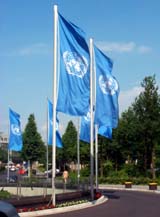|
Tuesday,
13 June:
The
Subsidiary Body for Scientific and Technological Advice (SBSTA)
convened in morning and afternoon sessions to consider the development
and transfer of technologies, cooperation with relevant international
organizations, policies and measures and methodological issues.
The Subsidiary Body for Implementation (SBI) addressed arrangements
for intergovernmental meetings and administrative and financial
matters. The Joint Working Group on Compliance (JWG) discussed the
Co-Chairs' text. Contact groups met to consider: administrative
and financial matters; land use, land-use change and forestry (LULUCF);
adverse effects; capacity building in countries with economies in
transition (EITs); and guidelines under Protocol Articles 5 (methodological
issues), 7 (communication of information) and 8 (review of information).
The Friends of the Chair group on the technology transfer consultative
process also convene.
|
 |
SBI |
|
|
|
Many delegates
thanked the French Government for its offer to host SB-13.
The SBI also endorsed MOROCCO's offer to host COP-7 in Marrakesh.
|
|
|
|
|
 Regarding COP-6, the NETHERLANDS
said progress must be made on all aspects of the Buenos Aires
Plan of Action. Relaying a message from the incoming President
of COP-6, he said COP-6's outcome must be environmentally
credible and based on common but differentiated responsibilities.
Regarding COP-6, the NETHERLANDS
said progress must be made on all aspects of the Buenos Aires
Plan of Action. Relaying a message from the incoming President
of COP-6, he said COP-6's outcome must be environmentally
credible and based on common but differentiated responsibilities. |
|
SBSTA |
|
|
|
Technology
transfer
|
|
|
|
 Several developing countries supported the G-77/CHINA's
call for the formation of a contact group at this session
Several developing countries supported the G-77/CHINA's
call for the formation of a contact group at this session
|
|
|
|
 The EU stressed co-ordination of existing sources of
funding. and highlighted the CDM's role in advancing technology
transfer to developing countries. He also underscored public
and private sector effort.
The EU stressed co-ordination of existing sources of
funding. and highlighted the CDM's role in advancing technology
transfer to developing countries. He also underscored public
and private sector effort. |
|
|
Reports
from intergovernmental organizations
|
|
|
|
|
|
|
|
|
|
|
|
Interview with Sandea De Wet
|
Sandea De Wet (South Africa)
said that the importance of having a compliance system under the
Protocol lies in its ability to enhance Parties' compliance with
their commitments. With regard to the principle of common but
differentiated responsibilities, De Wet suggests that the compliance
system should apply to both developed and developing countries,
but existing differences in national commitments, obligations
and structures should be recognized and built into that system.
Furthermore, De Wet noted that in the interests of the environment,
a precautionary approach should be employed in the compliance
system in order to be preventative, and err on the side of caution
in decision-making.
 RealAudio of the interview
RealAudio of the interview
|